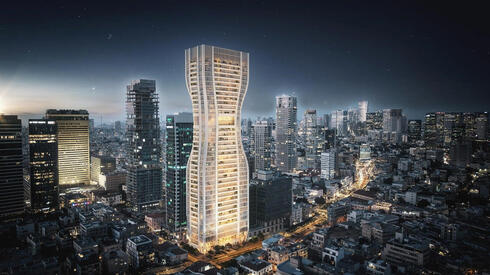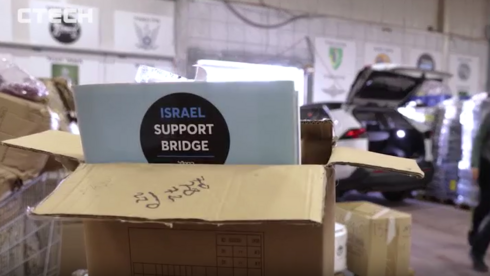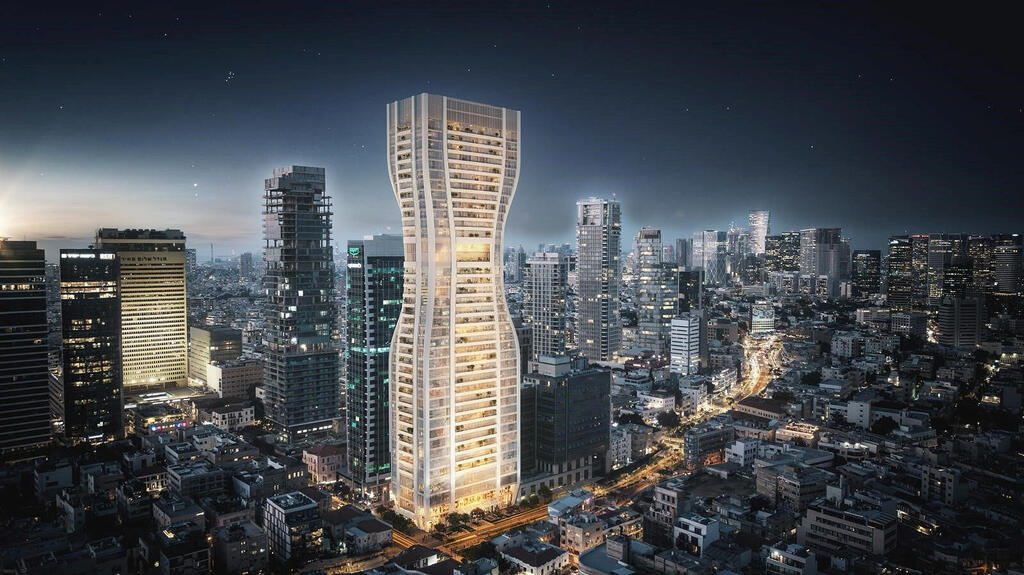
Tel Aviv real estate reaches new peak at over $45,000 per sqm
Israel Canada’s She project challenges pricing norms in one the city’s most sought-after districts.
Israel Canada has begun marketing apartments in its new She project in Tel Aviv at NIS 165,000 ($46,200) per square meter, a price that would set a new benchmark for the city's high-end real estate market, Calcalist has learned.
For now, sales are limited to associates of company founders Barak Rosen and Assi Touchmair, as well as foreign buyers, who have been offered units on the building’s two highest floors.
The project, located at the intersection of Herzl and Yehuda Halevi streets, integrates three existing structures: the historic Mani House, which will be preserved; the Bank Leumi management building, which will undergo renovations; and the bank’s main branch, which will be demolished to make way for the new tower. Construction is expected to begin within a month and be completed in approximately five years.
Rising prices in Tel Aviv’s luxury market
Nearby, at 10 Rothschild Boulevard, apartments in a luxury development by Tidhar have been sold for NIS 145,000–150,000 ($40,600–$42,000) per square meter, according to February 2024 data from Israel’s Tax Authority.
A senior real estate appraiser described Israel Canada’s pricing strategy as aggressive. “The Tidhar project at Rothschild 10 is in a better location, and apartments on the upper floors of the David Promenade Residences, which offer a 180-degree view of the sea, were sold at similar prices. Israel Canada is aiming high, likely to demonstrate financial strength to lenders and reduce financing costs.”
Real estate appraiser Shmulik Cohen, CEO of S.K. Appraisal, also questioned the pricing. “This is undoubtedly a high-end project that incorporates historic preservation, but the ultra-luxury market in Tel Aviv has seen fewer transactions over the past two years. The highest prices per square meter have mostly been recorded in waterfront projects.”
However, Itsik Refael, an appraiser at Kamil Treshanski Refael, believes the price is justified. “This is an ultra-luxury project in an area where such developments are rare, overlooking Neve Tzedek and HaMesila Park. The residential floors start from the 30th level, above an opulent lobby, and the building will offer premium amenities, including a pool and spa. Given the scarcity of available land in Tel Aviv’s prime locations, this pricing aligns with the project’s exclusivity.”
One of Tel Aviv’s most expensive land acquisitions
The land for the project, at 33-36 Yehuda Halevi Street, was acquired by Acro Real Estate and Israel Canada in 2017 for NIS 277 million ($77.6 million). In 2020, Israel Canada purchased Acro’s stake for NIS 220 million ($61.6 million), valuing the entire site at NIS 440 million ($123.3 million).
Situated in one of Tel Aviv’s most sought-after districts, the area is home to leading financial institutions and high-tech firms. The lot acquired for the project is significantly larger than other properties sold in the vicinity in recent years.
Project details and financial outlook
The development, designed by Bar Orian Architects, received approval from the District Planning Committee in 2020, with final approval from the Local Planning Committee four years later.
Under the approved plan Mani House will feature ground-floor commercial spaces and a public passage connecting HaMesila Park to Yehuda Halevi Street. The Bank Leumi management building will also include commercial areas facing Yehuda Halevi Street and HaMesila Park. A 40-story tower will be constructed, comprising of ground-floor retail, two floors for public use, 14 office floors, seven hotel floors, three lobby levels, 13 residential floors, with 102 apartments, and five underground parking levels
According to Israel Canada, the estimated construction cost for the project is NIS 2 billion ($560 million). The company projects total sales revenue of NIS 2.3 billion ($644 million) and gross profits of NIS 645 million ($181 million), representing a 33% profit margin.















